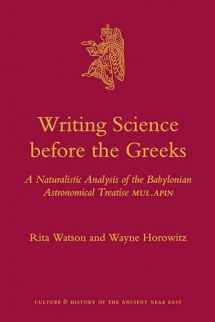
Writing Science Before the Greeks: A Naturalistic Analysis of the Babylonian Astronomical Treatise MUL.APIN (Culture and History of the Ancient Near East, 48)
ISBN-13:
9789004202306
ISBN-10:
9004202307
Author:
Wayne Horowitz, Rita Watson
Publication date:
2011
Publisher:
Brill Academic Pub
Format:
Hardcover
222 pages
FREE US shipping
Book details
ISBN-13:
9789004202306
ISBN-10:
9004202307
Author:
Wayne Horowitz, Rita Watson
Publication date:
2011
Publisher:
Brill Academic Pub
Format:
Hardcover
222 pages
Summary
Writing Science Before the Greeks: A Naturalistic Analysis of the Babylonian Astronomical Treatise MUL.APIN (Culture and History of the Ancient Near East, 48) (ISBN-13: 9789004202306 and ISBN-10: 9004202307), written by authors
Wayne Horowitz, Rita Watson, was published by Brill Academic Pub in 2011.
With an overall rating of 3.5 stars, it's a notable title among other
books. You can easily purchase or rent Writing Science Before the Greeks: A Naturalistic Analysis of the Babylonian Astronomical Treatise MUL.APIN (Culture and History of the Ancient Near East, 48) (Hardcover) from BooksRun,
along with many other new and used
books
and textbooks.
And, if you're looking to sell your copy, our current buyback offer is $0.41.
Description
The beginnings of written science have long been associated with classical Greece. Yet in ancient Mesopotamia, highly-sophisticated scientific works in cuneiform script were in active use while Greek civilization flourished in the West. The subject of this volume is the astronomical series MUL.APIN, which can be dated to the seventh century BCE and which represents the crowning achievement of traditional Mesopotamian observational astronomy. Writing Science before the Greeks explores this early text from the perspective of modern cognitive science in an effort to articulate the processes underlying its composition. The analysis suggests that writing itself, through the cumulative recording of observations, played a role in the evolution of scientific thought. "All in all, the authors should be congratulated for this groundbreaking study. Apart from significant new insights into MUL.APIN it has opened up a new avenue for research on ancient scientific texts that is likely to yield further interesting results, particularly if the cognitive analysis is combined with other approaches."Mathieu Ossendrijver, Humboldt University


We would LOVE it if you could help us and other readers by reviewing the book
Book review

Congratulations! We have received your book review.
{user}
{createdAt}
by {truncated_author}


